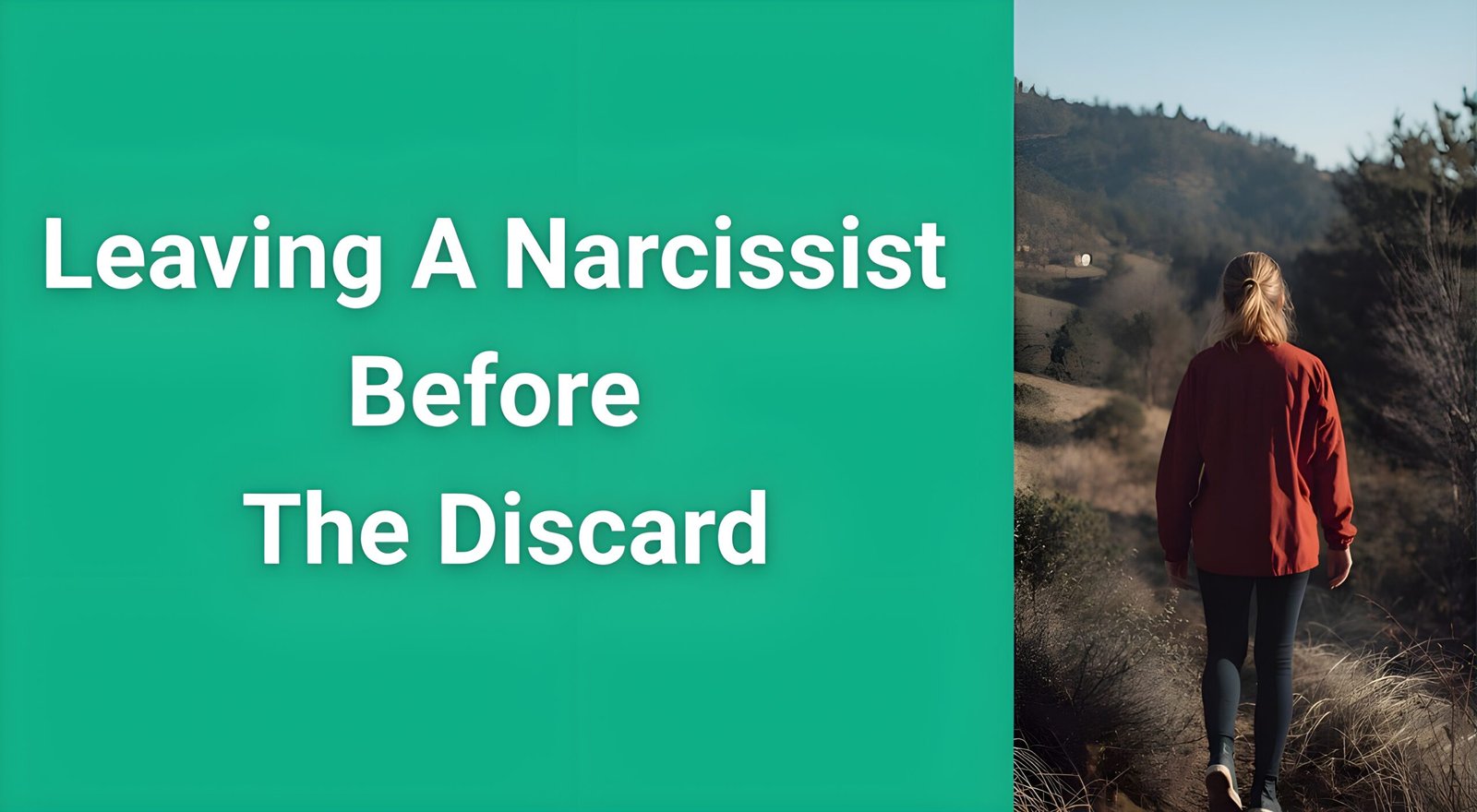The moment you realize you’re leaving a narcissist before the discard might be the most empowering decision of your life. Unlike waiting for them to discard you—which leaves you devastated and blindsided—taking control of your exit gives you power, dignity, and a strategic advantage in reclaiming your life.
- Understanding the Narcissistic Discard Phase
- Warning Signs Your Narcissist Is Planning to Discard You
- Why Leaving a Narcissist Before the Discard Is Crucial
- Your Step-by-Step Exit Strategy
- What to Expect When You Leave First
- Protecting Yourself from Narcissistic Retaliation
- Special Considerations: When You Can’t Leave Immediately
- Building Your New Life After Leaving
- The Long-Term Benefits of Leaving First
- Frequently Asked Questions
- Conclusion
Most people caught in narcissistic relationships wait until they’re completely destroyed by the discard phase. But you don’t have to be one of them. Understanding the narcissistic abuse cycle and recognizing the warning signs can help you escape before the final, devastating blow.
This comprehensive guide will walk you through everything you need to know about leaving a narcissist before they discard you, including warning signs, strategic planning, and protection tactics that actually work.
Understanding the Narcissistic Discard Phase
Before diving into your exit strategy, it’s crucial to understand what the narcissistic discard phase actually is and why leaving a narcissist before the discard is so important.
The narcissistic abuse cycle follows a predictable pattern: idealization (love bombing), devaluation, and finally, discard. The discard phase represents the moment when the narcissist has extracted maximum value from you and no longer sees you as useful for their narcissistic supply.
What Happens During a Typical Discard
When a narcissist discards someone, it’s rarely gentle or kind. The discard phase often involves:
- Sudden emotional withdrawal and cold indifference
- Complete cessation of affection and intimacy
- Blame-shifting for all relationship problems
- Public humiliation and smear campaigns
- Financial manipulation and control
- Using children or shared assets as weapons
- Immediate replacement with new narcissistic supply
The psychological damage from being discarded by a narcissist can be catastrophic. Survivors often describe feeling worthless, confused, and completely shattered. Many struggle with complex PTSD, depression, and anxiety for years afterward.
Why Narcissists Discard People
Understanding the narcissist’s motivation helps you recognize when a discard is imminent:
Loss of Control: When you start setting boundaries, calling out their behavior, or showing signs of independence, you become less valuable as narcissistic supply.
New Supply Available: Narcissists often line up replacement partners before discarding their current victim, ensuring they never have to be alone.
Boredom or Lack of Challenge: Once they’ve broken you down completely, you’re no longer interesting or challenging to them.
Fear of Exposure: If you’re getting too close to uncovering their true nature or exposing their lies, they’ll discard you to protect themselves.
Seasonal or Cyclical Patterns: Many narcissists follow predictable discard patterns, often around holidays, anniversaries, or major life events.
Warning Signs Your Narcissist Is Planning to Discard You
Recognizing these red flags early can help you prepare for leaving a narcissist before the discard happens. The key is understanding that these behaviors represent a shift in the narcissistic abuse cycle, not temporary relationship problems.
1. Increasing Devaluation and Criticism
The criticism becomes more frequent, more cruel, and more public. What started as occasional put-downs escalates to constant belittling about your appearance, intelligence, career, family, and personal characteristics.
You might notice:
- Sarcastic comments disguised as jokes
- Backhanded compliments that leave you feeling inadequate
- Public embarrassment in front of friends or family
- Comparison to other people (often their new supply)
- Dismissal of your achievements or contributions
2. Emotional Withdrawal and Indifference
The narcissist becomes emotionally distant, showing little interest in your life, feelings, or experiences. This isn’t the hot-and-cold behavior typical of earlier abuse phases—it’s a consistent, cold indifference.
Warning signs include:
- No longer asking about your day or showing interest in your life
- Refusing physical intimacy or affection
- Not responding to your emotional needs or distress
- Acting like you’re invisible when you’re in the same room
- Showing more warmth to strangers than to you
3. Future-Faking Stops Completely
All those promises about your future together—vacations, moving in together, marriage, shared goals—suddenly disappear from conversation. The narcissist avoids discussing any long-term plans and may even explicitly state they’re not sure about the relationship’s future.
4. Secretive Behavior and Boundary Violations
Their phone becomes off-limits, they’re secretive about their whereabouts, and they may start mentioning new “friends” who seem to occupy more of their time and attention.
5. Financial Manipulation Intensifies
If you share finances, they might start hiding money, making large purchases without consultation, or refusing to contribute to shared expenses. This behavior often accelerates as they prepare for their exit.
6. Smear Campaign Preparation
You might notice they’re telling people distorted stories about your relationship, painting themselves as the victim and you as the problem. Friends or family members might start treating you differently based on lies the narcissist has spread.
Why Leaving a Narcissist Before the Discard Is Crucial
Leaving a narcissist before the discard isn’t just about timing—it’s about reclaiming your power and protecting your psychological well-being. Here’s why taking control of your exit is so important:
Psychological Advantages
When you leave first, you maintain agency over your life story. Instead of being the “crazy ex” they discarded, you become the strong person who recognized toxic behavior and chose to leave. This narrative shift is crucial for your healing and recovery.
Reduced Trauma Impact
Being discarded by a narcissist often causes severe psychological trauma, including complex PTSD symptoms. By leaving first, you avoid the devastating emotional damage of abandonment and rejection that characterizes the discard phase.
Strategic Planning Time
When you’re not in crisis mode from being suddenly discarded, you can make rational decisions about finances, living arrangements, child custody, and other practical matters.
Disrupting Their Control
Narcissists count on you being too traumatized and broken to fight back effectively. By leaving first, you disrupt their power dynamic and maintain your ability to think clearly and protect yourself.
Your Step-by-Step Exit Strategy
Successfully leaving a narcissist before the discard requires careful planning and strategic thinking. This isn’t about dramatic confrontations—it’s about quietly, systematically preparing for your escape.
Phase 1: Recognition and Reality Testing
Before you can leave, you need complete clarity about what you’re dealing with. Many people struggle with cognitive dissonance, wondering if they’re overreacting or if the relationship can be saved.
Document the Abuse: Keep a detailed record of incidents, including dates, witnesses, and your emotional state. This helps combat gaslighting and provides clarity when you doubt yourself.
Reality Check with Trusted Friends: Reach out to people outside the narcissist’s influence who can provide objective perspective on your situation.
Professional Validation: If you’re unsure about your situation or need expert confirmation of the abuse patterns you’re experiencing, consider getting a professional assessment. A Narcissistic Abuse Clarity Report can provide the validation and understanding you need to move forward with confidence.
Phase 2: Safety Planning
Your safety—physical, emotional, and financial—must be the top priority when planning your exit.
Secure Important Documents: Gather birth certificates, passports, social security cards, financial records, and any evidence of abuse in a safe place outside your shared home.
Establish Financial Independence: Open a separate bank account, gather cash, and ensure you have access to funds the narcissist cannot control or monitor.
Create a Support Network: Identify trusted friends, family members, or professionals who can provide emotional support and practical help during your exit.
Plan Your Living Situation: Arrange temporary or permanent housing that the narcissist cannot access or monitor.
Technology Security: Change passwords, secure your devices, and consider getting a new phone number that the narcissist doesn’t know.
Phase 3: Breaking the Trauma Bond
One of the biggest obstacles to leaving a narcissist before the discard is the powerful trauma bond that keeps you psychologically attached to your abuser.
Trauma bonds form through intermittent reinforcement—cycles of abuse followed by love bombing or relief. These bonds create a neurological addiction similar to substance dependency, making it extremely difficult to leave even when you know the relationship is harmful.
Understanding Your Addiction: Recognize that your attachment to the narcissist isn’t love—it’s a biochemical addiction created by their manipulation tactics.
Gradual Detachment: Start emotionally detaching by limiting deep conversations, reducing physical intimacy, and creating mental distance.
Professional Support: Consider working with a trauma-informed therapist who understands narcissistic abuse dynamics.
Structured Recovery Program: A systematic approach like the 30-Day Trauma Bond Recovery Workbook can provide daily exercises and strategies to help you break free from the psychological chains keeping you trapped.
Phase 4: The Actual Exit
When you’re ready to leave, do it strategically and safely.
Choose Your Timing: Leave when the narcissist is not present, or in a public place if confrontation is unavoidable.
Keep Communication Minimal: Don’t engage in lengthy explanations or justifications. A simple “This relationship isn’t working for me” is sufficient.
Expect Love Bombing: The narcissist will likely attempt to pull you back with promises, gifts, and declarations of love. Remember that this is manipulation, not genuine change.
Implement No Contact: The most effective protection strategy is complete cessation of communication.
Phase 5: Protecting Yourself Post-Exit
Leaving a narcissist before the discard doesn’t end when you walk out the door. The real challenge often comes afterward, when the narcissist realizes they’ve lost control and launches their retaliation campaign.
What to Expect When You Leave First
When you successfully execute leaving a narcissist before the discard, their reaction will likely be intense and multifaceted. Understanding what to expect helps you prepare psychologically and practically.
Narcissistic Rage and Injury
Your decision to leave first inflicts what’s called a “narcissistic injury”—a blow to their ego and sense of superiority. They cannot comprehend how their “inferior” victim could have the audacity to reject them.
Expect:
- Explosive anger and verbal attacks
- Threats (legal, financial, or personal)
- Attempts to punish you through mutual friends, family, or children
- Escalated harassment and stalking behaviors
Hoovering Attempts
Named after the vacuum cleaner, “hoovering” refers to the narcissist’s attempts to suck you back into the relationship. This might include:
- Love bombing with gifts, flowers, and promises of change
- Fake emergencies or crises requiring your help
- Using flying monkeys (friends or family) to plead their case
- Threats of self-harm or suicide
- Showing up at your workplace or home uninvited
Smear Campaign Intensification
The narcissist will launch an aggressive campaign to damage your reputation and credibility. They’ll paint themselves as the victim of your “cruel abandonment” while portraying you as unstable, selfish, or abusive.
Immediate Replacement
Don’t be surprised if the narcissist quickly finds new supply. This isn’t a reflection of your worth—it’s evidence that they cannot tolerate being alone and need constant validation.
Legal or Financial Retaliation
If you share assets, children, or legal obligations, expect the narcissist to weaponize these connections. They might:
- Refuse to pay agreed-upon expenses
- File false police reports or restraining orders
- Use custody issues to continue controlling you
- Hide or waste marital assets
Protecting Yourself from Narcissistic Retaliation
Successfully leaving a narcissist before the discard requires ongoing protection strategies to shield yourself from their inevitable retaliation attempts.
Implement Strict No Contact
No contact isn’t just about not talking to the narcissist—it’s about creating an impenetrable barrier between their chaos and your peace.
Block All Communication Channels: Phone numbers, email addresses, social media accounts, and any other way they might reach you.
Inform Your Support Network: Let trusted friends, family, and coworkers know not to share information about you or pass along messages.
Legal Documentation: Keep records of all violation attempts for potential restraining order applications.
Social Media Lockdown: Make all accounts private and remove any mutual friends who might report your activities back to the narcissist.
Document Everything
Maintain detailed records of all harassment, threats, or contact attempts. This documentation serves multiple purposes:
- Evidence for law enforcement if needed
- Validation for yourself when you start doubting the severity of their behavior
- Support for legal proceedings like custody battles or restraining orders
Build Your Support System
Recovering from narcissistic abuse is not a solo journey. Surround yourself with people who understand what you’ve been through and can provide both emotional support and practical assistance.
Professional Support: Work with therapists who specialize in narcissistic abuse recovery and understand complex trauma.
Peer Support Groups: Connect with other survivors who can relate to your experiences without judgment.
Trusted Friends and Family: Maintain relationships with people who knew you before the narcissist and can help you remember who you really are.
Special Considerations: When You Can’t Leave Immediately
Sometimes leaving a narcissist before the discard isn’t immediately possible due to practical constraints like finances, children, legal issues, or safety concerns. If you find yourself in this situation, you’re not powerless—you can still protect yourself and prepare for eventual freedom.
Survival Strategies While Planning Your Exit
Gray Rock Method: Become as boring and unresponsive as possible to reduce the narcissist’s interest in engaging with you.
Information Diet: Share no personal information, feelings, or plans with the narcissist.
Emotional Detachment: Start viewing interactions with the narcissist as business transactions rather than personal relationships.
Secret Support: Quietly build your support network and resources without the narcissist’s knowledge.
Safety First: If you’re in physical danger, prioritize immediate safety over long-term planning.
For those in particularly complex situations where immediate exit isn’t feasible, specialized guidance like “How to Survive When You Can’t Leave Yet” can provide tailored strategies for maintaining your sanity and safety while preparing for eventual escape.
Financial Planning When Trapped
Secret Savings: Set aside small amounts of money when possible, even if it’s just loose change.
Skill Development: Quietly work on skills that could help you become financially independent.
Legal Preparation: Understand your rights regarding shared assets, debts, and support obligations.
Credit Protection: Monitor your credit reports and protect your financial identity.
Building Your New Life After Leaving
Leaving a narcissist before the discard is just the beginning of your recovery journey. Building a healthy, fulfilling life after narcissistic abuse requires intentional effort and often professional support.
Healing from Trauma Bonds and Abuse
The psychological effects of narcissistic abuse can persist long after you’ve left the relationship. Common challenges include:
- Difficulty trusting your own judgment
- Hypervigilance and anxiety
- Depression and feelings of emptiness
- Confusion about your identity and worth
- Fear of future relationships
Rebuilding Your Identity
After extended narcissistic abuse, many survivors struggle to remember who they were before the relationship. This process of identity reconstruction is crucial for long-term healing.
Reconnect with Pre-Relationship Interests: What did you enjoy before you met the narcissist? What dreams or goals did you abandon?
Establish New Routines: Create daily practices that nurture your well-being and reflect your values.
Set Healthy Boundaries: Learn to identify and communicate your limits with all people, not just narcissists.
Practice Self-Compassion: Treat yourself with the kindness you would offer a good friend going through the same experience.
Red Flags for Future Relationships
Once you’ve experienced narcissistic abuse, it’s crucial to develop strong awareness of warning signs to avoid similar relationships in the future.
Early red flags include:
- Love bombing or moving the relationship very quickly
- Attempts to isolate you from friends and family
- Excessive need for control or monitoring
- Inability to take responsibility for mistakes
- Lack of empathy for others’ feelings or experiences
- Grandiose sense of self-importance
- Belief that they’re special or unique
The Long-Term Benefits of Leaving First
While leaving a narcissist before the discard is challenging, the long-term benefits far outweigh the temporary difficulties:
Preserved Self-Esteem
By taking control of your exit, you maintain dignity and self-respect that would be destroyed by enduring a discard.
Faster Recovery
Survivors who left first often report shorter recovery times and less severe trauma symptoms compared to those who were discarded.
Stronger Future Relationships
Learning to recognize and leave toxic situations makes you better equipped to identify and maintain healthy relationships.
Personal Empowerment
Successfully executing your escape plan builds confidence in your ability to protect yourself and make difficult decisions.
Breaking Generational Patterns
By refusing to accept abuse, you model healthy behavior for any children and prevent passing trauma patterns to the next generation.
Frequently Asked Questions
Will the narcissist try to get me back if I leave first?
Yes, most narcissists will attempt hoovering—using various tactics to pull you back into the relationship. This might include love bombing, false emergencies, or using others to plead their case. Remember that these attempts are about regaining control, not genuine change.
How do I know if I should leave or try to work things out?
If you’re dealing with a true narcissist, there is no “working things out.” Narcissistic personality disorder is a deeply ingrained pattern that doesn’t respond to traditional relationship counseling. If you’re questioning whether to leave, document the behaviors you’re experiencing and consider getting professional assessment.
What if I still love them?
What you’re feeling likely isn’t love—it’s a trauma bond created by intermittent reinforcement and psychological manipulation. These feelings are real and powerful, but they don’t reflect the reality of your situation. Professional support can help you understand and work through these complex emotions.
How do I handle mutual friends and family?
Expect that the narcissist will launch a smear campaign to turn people against you. Focus on maintaining relationships with those who truly know you and are willing to hear your side. Don’t waste energy trying to convince people who have already chosen to believe the narcissist’s version of events.
Is it normal to feel guilty for leaving?
Absolutely. Narcissists deliberately cultivate guilt and obligation in their victims as control mechanisms. These feelings will fade as you heal and gain perspective on the relationship. The guilt you feel for leaving is nothing compared to the damage you’d suffer by staying.
What if we have children together?
Having children with a narcissist complicates the exit process but doesn’t make it impossible. You’ll likely need to implement modified no-contact (called “gray rock”) for necessary parenting communications. Document everything, maintain strict boundaries, and consider working with professionals who understand high-conflict co-parenting situations.
Conclusion
Leaving a narcissist before the discard is one of the most challenging yet empowering decisions you can make. While the process requires careful planning, courage, and ongoing support, the alternative—waiting to be discarded—leaves you devastated and powerless.
Remember that your decision to leave isn’t just about ending a toxic relationship—it’s about reclaiming your life, protecting your mental health, and creating space for genuine healing and growth. You deserve relationships built on respect, empathy, and authentic love, not manipulation and control.
The road ahead may be difficult, but every step you take away from narcissistic abuse is a step toward freedom, authenticity, and peace. You have the strength to leave, the wisdom to heal, and the resilience to build a beautiful life on your own terms.
Your freedom begins with a single decision: choosing yourself over their chaos. Make that choice today, and start writing the next chapter of your life—one where you’re the author, not their victim.






